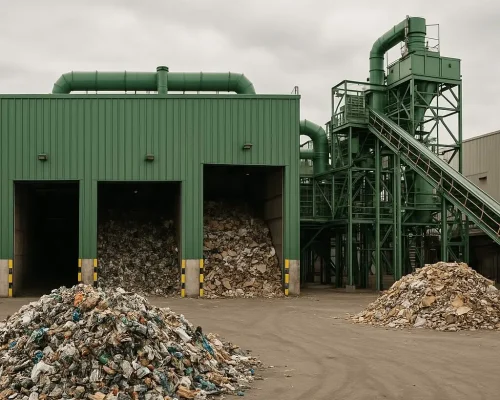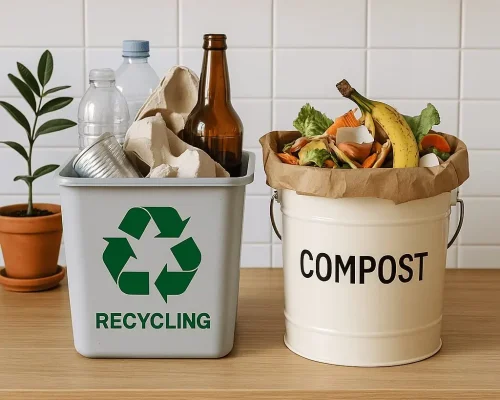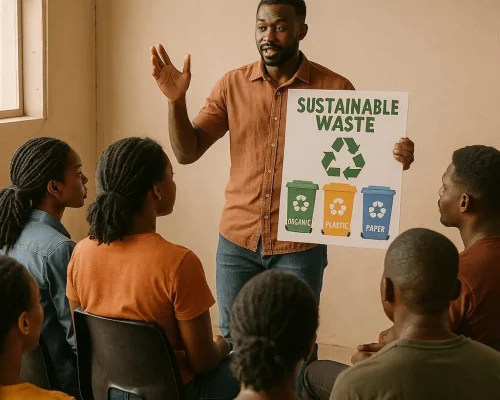Zero Waste Kenya
A Cleaner, Healthier Future Starts with You
Zero Waste Kenya champions Integrated Sustainable Waste Management to create a cleaner, greener future.
About the campaign
What is zero waste kenya?
Zero Waste Kenya is a national initiative focused on promoting sustainable waste management practices. Our mission is simple: to reduce, reuse, and recycle, while empowering every Kenyan to take responsibility for the waste they generate. By working together, we can create cleaner communities, improve public health, and ensure a greener future for all.
Our mission
Zero Waste Kenya is committed to empower individuals and communities to adopt sustainable waste management practices, reducing waste, and protecting the environment for future generations.
Our vision
We envision a zero-waste Kenya where individuals and organizations embrace responsible waste management, contributing to a cleaner and healthier environment.
technology
At Zero Waste Kenya, we use Samawati ToSHA, a plasma thermal technology that processes residual waste into reusable, non-toxic ash. By reducing GHG emissions by up to 98%, ToSHA minimizes landfill and incinerator impacts, offering both environmental and economic benefits through carbon credits.
How it works
Steps to Zero Waste
Achieving zero waste starts with simple actions. Segregate your waste, recycle materials, reuse items when possible, and educate others about sustainable living. Together, these actions create a lasting impact on our environment and future generations.

Step 1:
Reduce Waste
Instead of discarding items, reusing them gives products a second life. Whether it’s repurposing containers or upcycling materials, finding creative ways to reuse helps reduce the overall waste sent to landfills.

Step 2:
Segregate Waste
Segregating waste is the first and most crucial step toward zero waste. By categorizing waste into organic, recyclable, and non-recyclable materials, we ensure that each type of waste is treated appropriately, preventing contamination and maximizing recycling potential.

Step 3:
Drop waste at a Material Recovery Facility
Proper waste disposal starts with you. By taking your recyclable materials to a Material Recovery Facility (MRF), you ensure that valuable resources are sorted, processed, and repurposed. This simple step reduces landfill waste and promotes recycling, helping create a cleaner, more sustainable environment for everyone.

Step 4:
Recycle or compost
Recycling helps transform used materials into new products, while composting organic waste enriches the soil. Both methods reduce what goes to landfills, conserve resources, and support a healthier environment. Every item you recycle or compost moves us closer to a zero-waste future.

Step 5:
Educate Others
Sharing knowledge is the key to lasting change. By educating your family, friends, and community about sustainable waste practices, you inspire others to take action. The more people understand the importance of recycling, composting, and reducing waste, the closer we get to a cleaner, healthier environment for all. Together, we can build a zero-waste culture.

Step 6:
Report illegal dumping
Reporting illegal dumping is crucial for keeping our communities clean. When you report waste being discarded improperly, you help stop pollution and protect the environment. Every report makes a difference, ensuring a cleaner, healthier future for all.
statistics
According to the Sustainable Waste Management Policy 2021, every Kenyan generates about 0.5 kgs of waste every day for a population of 50 million Kenyans. This waste by composition is:
<20% is recovered
Cleaner Communities
Healthier Families
Green Jobs
Why Zero Waste Matters
By adopting Zero Waste practices, we can transform our environment. Cleaner streets mean healthier living spaces. Recycling creates green jobs that support sustainable economic growth. Together, we can build a future where waste no longer harms our planet.
Ready to Make a Difference?
Join the Zero Waste Movement and Be the Change Kenya Needs.
Whether you’re passionate about sustainable living, committed to reducing waste, or simply want to support better waste management in Kenya, there’s a place for you here.
Help us raise awareness, clean up communities, and inspire change on the ground.
Collaborate with us to build long-term solutions for a waste-free, circular economy in Kenya.
A Revolutionary Waste Management Solution
samawati ToSHA
Samawati ToSHA is transforming the way we manage waste with its cutting-edge plasma thermal decomposition technology. It safely processes even the most difficult materials, like biomedical waste and unrecyclable plastics, converting them into non-toxic ash that can be used in construction. ToSHA drastically reduces greenhouse gas emissions, eliminating up to 98% of harmful pollutants compared to traditional methods. By minimizing the environmental impact of waste, Samawati ToSHA is setting a new standard for sustainable waste management.
Join us in this revolution!
Help us deploy more ToSHA units and make a lasting impact on our environment.




